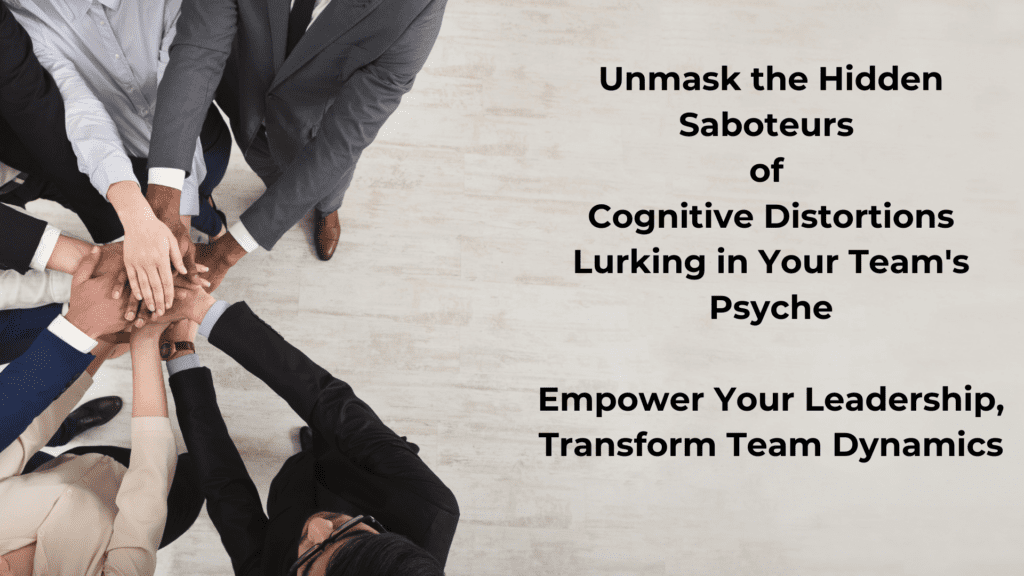Prelude to Understanding
In the labyrinth of human cognition, cognitive distortions in leadership lurk as silent architects of discord, weaving intricate patterns that can unravel the fabric of team cohesion. These irrational thought patterns, like invisible puppeteers, manipulate our perception of reality, often orchestrating a symphony of negative outcomes in both personal and professional arenas. Within the microcosm of team environments, these distortions can become catalysts for disruption, sowing seeds of miscommunication, clouding decision-making processes, and eroding the very foundation of team unity.
As we embark on this exploration, we must recognize that understanding and addressing these cognitive distortions is not merely beneficial—it is imperative for cultivating a workplace that thrives on productivity and harmony. The intersection of cognitive distortions and team dynamics presents a complex tapestry, one that demands our utmost attention and analysis.
The Ripple Effect: How Cognitive Distortions Reverberate Through Team Collaboration and Productivity
The impact of cognitive distortions on team dynamics is akin to dropping a stone in a still pond—the ripples extend far beyond the initial point of contact. Let’s dissect the multifaceted challenges these distortions present in team settings:
- Communication Chasms:
- Misinterpretations breed like wildfire, fueled by cognitive distortions.
- Assumptions act as invisible barriers, stifling open dialogue.
- The result? A landscape rife with conflicts and a dramatic reduction in collaborative efforts.
- Decision-Making Quagmires:
- Distorted thinking serves as a fog, obscuring clear judgment.
- This cognitive haze leads to flawed reasoning and, consequently, ineffective solutions.
- Teams find themselves navigating treacherous waters, where every decision is potentially compromised.
- Innovation Stagnation:
- Cognitive biases act as anchors, tethering teams to familiar shores.
- The comfort of the known becomes a siren song, luring teams away from uncharted territories of creativity.
- The result is a paradoxical paralysis—movement without progress, effort without innovation.
- Diversity and Inclusion Roadblocks:
- Biases, particularly the insidious affinity bias, erect invisible barriers.
- These barriers impede the creation of truly diverse and inclusive teams.
- The consequence? A homogeneous echo chamber that stifles growth and limits perspective.
Cognitive Distortions in Action: Real-World Scenarios Unveiling Team Dynamic Disruptions
To truly grasp the impact of cognitive distortions on team dynamics, we must observe them in their natural habitat. Consider these scenarios:
- The All-or-Nothing Abyss: Imagine a team member, let’s call her Sarah, who views projects through a binary lens. A project that meets 90% of its goals is, in her mind, a complete failure. This all-or-nothing thinking acts as a contagion, spreading demotivation throughout the team and fostering a reluctance to embrace new approaches.
- The Overgeneralization Trap: Picture a team that delivers a subpar presentation. Instead of viewing it as a single event, the team, caught in the overgeneralization web, begins to believe that all future presentations are doomed to fail. This cognitive distortion becomes a self-fulfilling prophecy, impacting morale and diminishing effort in future endeavors.
- The Personalization Pitfall: Envision a team leader, John, who interprets a team member’s lack of engagement as a personal affront. This personalization distortion creates a ripple effect of tension, gradually eroding team cohesion and trust.

The Leader’s Toolkit: Strategies for Identifying and Addressing Cognitive Distortions
Leaders stand at the forefront of the battle against cognitive distortions, armed with the power to shape team dynamics. Here’s how they can wield this power effectively:
- Awareness Cultivation and Educational Empowerment:
- Implement comprehensive training programs that illuminate the landscape of common cognitive distortions.
- Foster an environment where recognition of these distortions becomes second nature.
- The Open Dialogue Initiative:
- Champion a culture where open communication is not just encouraged but celebrated.
- Create safe spaces for team members to voice concerns and challenge distorted thinking patterns.
- The Feedback Loop Revolution:
- Institute regular, structured feedback sessions as cognitive distortion detection mechanisms.
- Use these sessions to identify patterns of distorted thinking and address them with constructive strategies.
Team Arsenals: Strategies to Combat the Cognitive Distortion Onslaught
Teams need not be passive victims of cognitive distortions. They can arm themselves with powerful strategies:
- The Diversity Advantage:
- Cultivate teams that are rich in diverse perspectives.
- This diversity acts as a natural counterbalance to individual biases, enhancing decision-making processes.
- Structured Decision-Making Frameworks:
- Implement robust frameworks like the WRAP method (Widen options, Reality-test assumptions, Attain distance, Prepare to be wrong).
- These structures serve as cognitive guardrails, minimizing the impact of biases on decision-making.
- The Mindfulness Revolution:
- Introduce mindfulness practices as tools for cognitive clarity.
- These practices enable individuals to become keen observers of their thought patterns, fostering more balanced decision-making.
The Cognitive Distortion Influence: Unraveling Decision-Making in Team Contexts
The tentacles of cognitive distortions extend deep into the decision-making processes of teams:
- The Confirmation Bias Trap: Teams often fall prey to seeking only information that aligns with their existing beliefs, creating an echo chamber effect that skews decision-making.
- The Anchoring Effect: Initial information, regardless of its relevance or accuracy, can disproportionately influence the entire decision-making process, leading teams astray.
- The Hindsight Illusion: Post-event, teams may falsely believe they predicted outcomes, a distortion that can significantly impact future planning and risk assessment strategies.

Charting the Course: Long-Term Strategies for Cognitive Clarity
Addressing cognitive distortions and their impact on team dynamics is not a sprint but a marathon. Consider these long-term strategies:
- Mindfulness as a Team Practice:
- Integrate regular mindfulness sessions into team routines.
- These practices serve as cognitive recalibration tools, fostering clearer thinking and more balanced decision-making.
- The Peer Feedback Revolution:
- Implement a system of regular, structured peer feedback.
- This system acts as a mirror, reflecting how cognitive distortions may be influencing team dynamics and individual behaviors.
- Expert Consultation:
- Don’t hesitate to bring in the big guns—psychologists or career coaches.
- Their expertise can be invaluable, especially when cognitive distortions significantly impact team leadership and overall dynamics.
Epilogue: The Path Forward
As we conclude this exploration of cognitive distortions and their profound impact on team dynamics, we stand at a crossroads. The path forward is clear, yet challenging. By recognizing and actively addressing these thought patterns, teams can unlock new levels of communication, decision-making prowess, and overall productivity.
The journey to mitigate cognitive distortions is not a destination but an ongoing process. It requires vigilance, commitment, and a willingness to challenge our own perceptions. As we implement strategies to combat these distortions, we pave the way for a more cohesive, effective, and harmonious team environment.
In the grand tapestry of team dynamics, cognitive distortions represent both a challenge and an opportunity. By unraveling these complex threads, we can weave a stronger, more resilient fabric of collaboration and success.
The question that remains is not whether we should address cognitive distortions in team dynamics, but how swiftly and effectively we can begin this transformative journey. The future of our teams—and indeed, our organizations—depends on our ability to master this intricate dance between cognition and collaboration.





